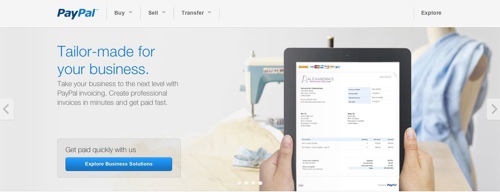
With FinovateEurope a month away, it seemed like a good time to check in with some of the European startups redefining innovation in financial technology. Today we bring you our conversation with the CEO of Numbrs, Julien Arnold.
Numbrs made its Finovate debut at FinovateFall 2013 in New York. The Switzerland-based, self-described “nonbank”demoed a personal finance app that combines bill pay, fund transfer and PFM into an easy-to-use mobile banking solution.
Additionally, the Numbrs app does more than help users see and analyze past spending and saving. The app also helps users anticipate and project their future financial behavior. This feature, called “Timeline” is one of the more unique aspects of the Numbrs app and potentially shows an important new direction in the PFM space.
Numbrs was founded in September 2012. The startup has raised more than $11 million in its 2013 Series A round. Follow Numbrs on Twitter @numbrs.
Finovate: You are making a move to the United States, and have opened in office in New York. Can you tell us some of the thinking behind this decision? How did you know the time was right?

Julien Arnold: Numbrs will expand to the US market and establish a new entity in the greater New York area. We’ve launched the app in Germany in November. The user, media, and investor feedback has been very good so far, and we are very confident that the product will be a huge success in the United States as well. That’s also why we decided to raise another 3.8 million USD to adjust Numbrs to the specific market needs. As soon as the product improvement process will be finished we’ll raise an additional amount of money to ensure the market launch.
Finovate: What are some of the major differences between mobile-first banking in Switzerland and the rest of Europe? What are some of the major differences between Switzerland and the United States? How will you deal with those differences in seeking to popularize Numbrs?
Arnold: For now Numbrs is only available in Germany. We are also planning to launch the product in Switzerland and the UK. Of course, the actual banking behaviour differs considerably from one country to another. Especially, Switzerland is a very sophisticated market.
Finovate: Talk about the Future Timeline. This was the feature that our publisher, Jim Bruene, was most impressed by. Can you talk a bit about the idea behind the Timeline, as well as the technology that makes this feature possible?
Arnold: Numbrs analyses your spending behaviour and existing transactions to calculate your future income and expenses.Your financial status, today and tomorrow, is shown on your timeline. Numbrs safely integrates with all your banks via securely encrypted protocols – such as HBCI in Germany – to aggregate all your financial data into an easy-to-understand overview, which we call the Timeline.
Through a combination of machine learning algorithms, each transaction is automatically categorised, and will be enriched with useful information, such as a logo of the counter party with which the transaction was made.
Finovate: What is your relationship with Centralway? How did it begin and how important has the relationship been to the development of Numbrs?
Arnold: Numbrs is a product created by the Company Builder Centralway. Numbrs profits from the infrastructure, the knowledge and the efforts each team member puts into the project. To partner up with Centralway has been a very important step for the successful roll out of Numbrs.
Finovate: The Numbrs business model is based on advertising. Do you see advertising as the major revenue source for the business a year from now? Three to five years from now?
Arnold: The business model offers a lot of potential for the future. There are numerous possibilities to increase revenue also outside of the field of advertising.
Finovate: Can you tell us a little about your background? Before Numbrs you were involved in building Groupon London. Is there anything in your experience with Groupon London that informs the work you are doing with Numbrs?
Arnold: Before my move to Centralway Headquarters in Zurich, Switzerland, I had various positions in different startups of which one was as at Groupon UK in London. Groupon evolved from a startup company to its IPO in no time. During that I had the chance to understand the challenges of a hyper growth company and would like to apply those learnings to Numbrs.
Finovate: Tell us a little about your team. Who do you work with most closely on a day-to-day basis?
Arnold: Numbrs is about technology and design. The biggest part of the team are developers. Although I’m not a technology expert, it’s very important to me that I can influence the product at all levels. Thats why I’m constantly in contact with our frontend and backend developers and work with them on the product level.
Finovate: What can we expect to see from Numbrs in the first few months of 2014?
Arnold: We’ll increase the marketing spendings in Germany and roll-out a 360 degree marketing campaign. Besides that I’ll focus on launching Numbrs in the United States and UK.
 Gartner’s Web Access Management Marketscope Report gives Ping Identity a positive rating.
Gartner’s Web Access Management Marketscope Report gives Ping Identity a positive rating.













